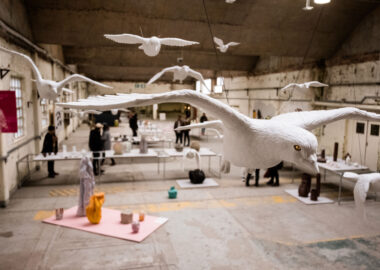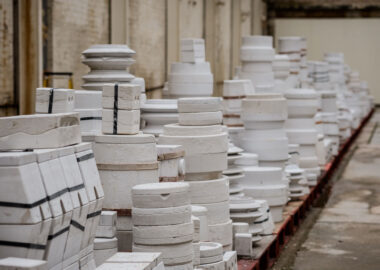‘Who will draw our pots in the future?’ Archaeologists and Ceramicists in Conversation
Free
- Visiting information
- Opening hours during the festival:
Mon - Sun: 10am - 5pm
Join us on October 9th for the ‘Who will draw our pots in the future?’ Archaeologists and Ceramicists in Conversation in the China Hall, Spode works, Stoke-on-Trent.
Fired clay, perhaps more than any other creative medium, has the potential to endure into the future and become archaeological evidence. Ceramic artists have often looked to the past for inspiration, sometimes adopting archaeological methods in what has been described as an ‘archival impulse’. By making new ceramic objects, we are ultimately adding to the archaeological record. Meanwhile, archaeology is increasingly recognised as an inherently creative enterprise, where archaeologists make, or design, the past in the present.
When you bring the practices of art and archaeology into dialogue – what happens? Is it too simplistic to characterise one of practices as being about imaginative design and one of the practices as about scientific study? Does each profession respond to the ‘thingness’ of ceramics in a different way? How does each profession approach the ideas of use and the aesthetic? Does each profession have a different perspective on the social value or even social activism of their work with ceramics? Given the creativity embodied in both professions – can or should either of them avoid sentimentality or nostalgia when working with notions such as technology, craftsmanship, change and loss.
This symposium will bring together leading archaeologists and ceramicists in a dialogue which will explore creative synergies between these two disciplines and discuss examples of collaborative practice. The second half of the symposium will be about artists and archaeologists thinking aloud about their own work with ceramics. They will listen to and share their thinking and provoke some debate about the differences and similarities in their approach and ethics, their creativity and discipline, as well as their products and outcomes.
Programme:
12.30 Arrival, registration and time to view BCB exhibition, move to Spode Heritage Museum (TBC)
13.00 Welcome and introduction (Dr Christopher McHugh, Ulster University, Janet Miller, MOLA, and Barney Hare Duke, BCB)
13.15 Professor Stephen Dixon, Manchester Metropolitan University, Excavate and Josiah Spode’s Violin
13.45 Dr Christopher McHugh, Ulster University, The Setomonogatari Project: Ceramics as an archaeology of the contemporary past
14.15 Lyn Blackmore and Nigel Jeffries, Medieval and Later Ceramics, Museum of London Archaeology (MOLA)
14.45 Coffee break
15.15 Professor Neil Brownsword, Staffordshire University, Externalising the Archive AND/OR Neil to do a guided tour of his installation, demonstration of 3D scanning of moulds, VR demo.
16.00 Plenary Discussion, Professor Neil Brownsword, Professor Stephen Dixon, Lyn Blackmore (MOLA), Nigel Jeffries (MOLA), Dr Christopher McHugh, chaired by Janet Miller, CEO MOLA
17.00 Close
Speakers include:
- Neil Brownsword, Professor of Ceramics at Staffordshire University
- Christopher McHugh, Lecturer in Ceramics, Ulster University
- Janet Miller, CEO, Museum of London Archaeology, Museum of London
- Jacqui Pearce, Senior Finds Specialist, Museum of London and President of the Society for Post Medieval Ceramics
(Question is a quote from Theaster Gates’ keynote at Ceramics in the Expanded Field Conference, July 2014.)
Related content
-

2019
British Ceramics Biennial returned to Stoke-on-Trent from 7 September- 13 October in 2019. This international festival of ceramics celebrated its 10th anniversary with an…
Past festivals Read more -

Externalising the Archive
Neil Brownsword leads a multidisciplinary team of artists in creating this ambitious, large-scale and closely researched installation on the Spode Works site, with an…
Activities Read more
